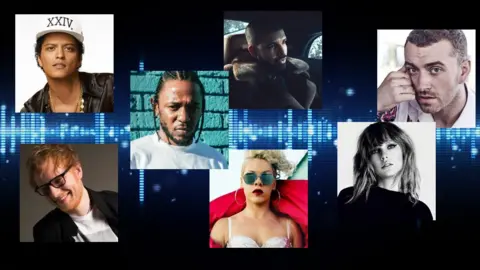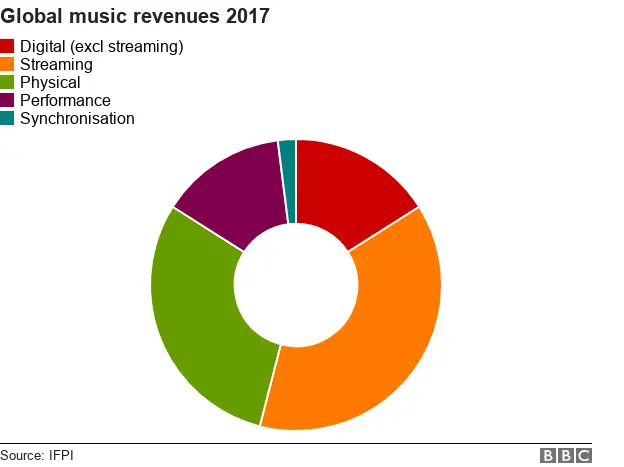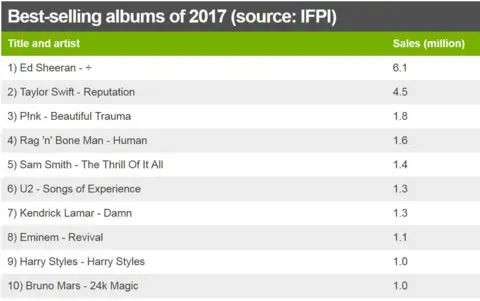Streaming is music's biggest money-maker
 BBC
BBCStreaming services like Spotify and Apple Music have become the biggest contributor to the music industry's coffers for the first time ever.
In total, streaming generated $7.1bn (£5bn) in 2017, more than sales of CDs and vinyl.
The number of people subscribing to a streaming service topped 176 million, up from 112 million a year before.
The boom helped record labels chalk up a third consecutive year of growth, after 15 years of decline.
According to the IFPI, which represents the global music industry, the music market was worth $17.3bn (£12.4bn) last year, up from $15.7bn the year before.
However, it noted, this is only two-thirds of what the industry made at the peak of the CD era in 1999.

British artists accounted for four of the Top 10 best-selling albums of 2017, with Ed Sheeran's ÷ topping the chart.
The star's third album sold 6.1 million copies worldwide, more than twice as many as 2016's biggest-seller - Beyonce's Lemonade.
And Bruno Mars's 90s throwback album 24k Magic made the Top 10 for a second year in a row, with sales of 1 million.

"We fought hard to get here," said Stu Bergen of Warner Music, "but we are not getting complacent".
The chief challenge, said the IFPI, is getting fair compensation from websites like YouTube and Facebook, which currently argue they can't be held liable for any videos uploaded by their users which infringe on copyrighted material.
"There is a structural fault in the system," said Frances Moore, the organistion's chief executive. "There's a mismatch between what platforms are making from [music] and what they're returning."
The IFPI is working to introduce legislation in Europe which would require these websites to offer greater compensation for musicians.
"We're definitely hopeful that, before Brexit, this legislation will be in place in Europe but also in place in the UK," Ms Moore told the BBC.
New markets
However, Europe recorded the lowest growth of any major music market last year - up 4.3% compared to 17.5% in Latin America and 12.8% in the US.
Ms Moore put this down to a slower uptake of streaming services in France and Germany, where fans have been reluctant to give up physical formats.
"In Germany, for example, it's an older population and they're very, very attached to their physical CDs," she said. "It is happening, it's just happening at a slower rate."

One of the fastest-growing territories is China - which saw revenues grow by 35% last year, making it the tenth-biggest music market last year.
The industry is hopeful that tapping into previously-underserved markets like China, India, Africa and the Middle East will help sustain its recovery.
"Africa is particularly exciting," said Adam Granite of Universal Music. "The potential for African repertoire to travel to other continents is enormous.
"We expect breakout superstar African talent to impact the world stage, and soon."
While artists like Fela Kuti, Miriam Makeba and Nigerian hip-hop star Wizkid have scored success outside Africa, Universal's recent acquisition of Kenyan label AI Records could produce a crossover hit in the vein of Luis Fonsi's Despacito.
The industry's other great hope is voice-activated technology. Research shows that smart speakers are predominantly used to play music, while the technology could soon transform the way we play music in our cars.
Mr Bergen said record labels were working with the likes of Amazon and Google to make voice commands more responsive and accurate.
"They are trying to accommodate local, colloquial speech as well as accents," he said.
"From what I understand, in Australia, they introduced to the word 'Aca-Daca' to one of the services so people could listen to AC/DC."

Follow us on Facebook, on Twitter @BBCNewsEnts, or on Instagram at bbcnewsents. If you have a story suggestion email [email protected].

